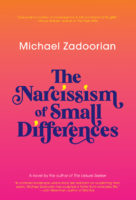Review by Brit McGinnis
Deciding not to have children means taking a life path different from the majority of people in modern society (if not the world). But after you decide to take that alternate path…what comes next?
In his latest book, The Narcissism of Small Differences, Michael Zadoorian explores the question of “what comes next” with the couple of Joe and Ana. They both turn 40 in the course of the novel and are each dealing with this question in opposite ways. They definitely don’t want to have children and buy the house with the white picket fence. Zadoorian approaches their struggle to define a life path without conventional markers with sensitivity and self-awareness.
Between Angst and Uncertainty
We meet Joe and Ana at a crossroads in their careers. Although still very much in love, an unspoken resentment exists between them. Ana has been financially supporting the couple for the last decade. Joe has worked unsteadily as a freelance writer, and Ana has found success in advertising but is being asked to take on more and more responsibility. She no longer believes as strongly in the work but doesn’t want to shy away from working hard.
Throughout the story, Joe and Ana are becoming acutely aware of their age. They’re seeing more and more how they don’t fit in with the trendy young people of Detroit or the people their age whom they perceive as having given up on their dreams and fled to the suburbs. Zadoorian writes lovingly about the city of Detroit in his other works and the relationship people have to decay and change overall. In The Narcissism of Small Differences, he also beautifully illustrates these tensions (and genuine aches to find authenticity within a city undergoing change) in the events that take place over five months in Ana and Joe’s relationship.
Finding a Place in Culture
The book spends a great deal of time discussing pop culture and our relationship to it, a theme that at first doesn’t seem to fit with the personal story of Ana and Joe. But pop culture as identity emerges as a backbone of the entire story, particularly within a city like Detroit caught between several different identities. Is it a rock capital? A hipster haven? A corpse of a city that refuses to die?
Readers may fear that this book will fall into the chasm of back-in-my-day Generation X naval gazing. But Zadoorian’s characters interrogate this very urge, challenging themselves in a self-deprecating manner about why they’re entitled to feel cool. Irony itself becomes a character within the pages. The older characters (meaning characters in the 40s) ask themselves why they spend so much time studying the art of others, or why celebrating something that they know is kitsch brings them joy. If anything, the book asks the questions that every back-in-my-day kvetching alternative newspaper columnist should ask themselves: If someone makes decisions to deviate from conventional society, are those choices even their own?
Finding the “Why”
Numerous times in the book, Ana finds herself explaining or defending her choice not to have children (even if it’s just to herself). Her mental preparation and go-to reasons will be familiar to anyone who’s had to answer questions from curious colleagues or family members. But this doesn’t explain so much about her — why she chooses to advance in her career even when things feel dubious, why she stays with Joe even though he makes so much less money, and why they both stay in a declining city whose flaws become more visible by the week. These impetuous questions are raised over and over again by various characters. Ana herself resents the fact that women who have more conventional lives consistently appear to try and recruit her to their “team.”
But over the course of the book, the “why” behind this couple’s decisions slowly begins to emerge. This is the true reason to read this story — the diligent quest that both of them go on to find the reason behind their decisions. At their age, the different paths everyone has chosen for their lives have mostly borne fruit. As Joe observes, perhaps there isn’t a better or worse choice. They’re all just different from one another. So when the desire to rebel feels dated, a deeper driving force needs to emerge.

Brit McGinnis is an author and editor from Portland, OR. She writes on Medium, The Salve, and covers weird news for The Stacker. She was named a Hero of Haddonfield by the filmmakers behind Tales of Halloween in 2014.

